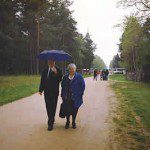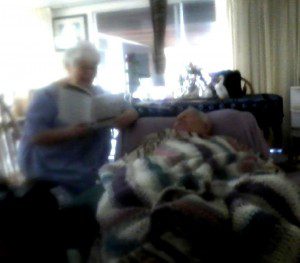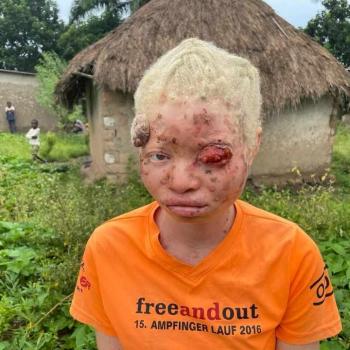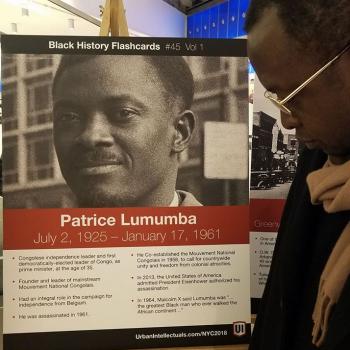It is January 3, 2016, and I am feeling nostalgic. My mother died for fifteen minutes in October when her heart arrested as she was being wheeled in to the OR to have a pacemaker placed. My father continues in his relentless but merciful decline–which has included several reprieves. They are asleep, and I am doing the nighttime parent care–a measure we have taken to be sure they are safe. (Indeed, I have had to call 911 twice. Each has had one fall.)
I am surrounded by family photos, and contemplating the legacy of my parents’ remarkable marriage and the legacy we Blair children have received. I wanted to share one of Dad’s stories with my readers, in his own words. It’s a true story, but he has a way of making it simple and dramatic. He and Mom talk about the Hill of Crosses in Lithuania here.
I have chosen to re-publish a piece I wrote in 2004 about my parents on their mission. It means even more today than it did then.
I t’s tithing on a life, the time young Mormon missionaries offer in the service of their God. At age twenty, a Latter-day Saint man is often devoting two years (ten pent of his time on earth) to a cause more noble and more demanding than any he has yet served. His days, heretofore taken up with math assignments, English papers, cars, and sports, are now dedicated to much more difficult duties. A missionary will find himself paired with a similarly dedicated companion-perhaps a former competitor, or perhaps someone from a place he has never heard of.
t’s tithing on a life, the time young Mormon missionaries offer in the service of their God. At age twenty, a Latter-day Saint man is often devoting two years (ten pent of his time on earth) to a cause more noble and more demanding than any he has yet served. His days, heretofore taken up with math assignments, English papers, cars, and sports, are now dedicated to much more difficult duties. A missionary will find himself paired with a similarly dedicated companion-perhaps a former competitor, or perhaps someone from a place he has never heard of.
This young missionary may serve in a country he didn’t know existed until he saw the name on his mission call, or he may serve a few hours away from home. The place is of little consequence, because the calling itself-to “feed my sheep”-doesn’t change. So the missionary, likely accustomed to nothing more earthy than summer jobs mowing lawns, may find himself putting medicine into chickens’ eyes to help a Guatemalan farmer, cleaning up after a flood in Florida, building a new chapel (sometimes not even a Mormon chapel), or talking about God to people who, for half a century, have believed that religion is “the opiate of the people.” He will teach about the restoration of the Gospel of Jesus Christ-not only through his words but through his very presence. He will learn how to clasp the hand of the person he’s baptizing, and will love the sound of water accepting the immersion, whether it takes place in an ocean, a river, or in a well-built font.
Of course, this young man will be joined by sister missionaries and older couples, all engaged in different aspects of the same work. From the beginning of Christendom, and from the early days of Mormonism, it has been so. These “happy few”-the band of brothers and sisters, male and female, old and young-press forward like a shining army.
When my father, Robert Blair, received his patriarchal blessing at age eleven, he was told that he had “the gift of tongues.” Eight years later, Dad was waiting for his mission call. He had studied Russian at BYU and longed to serve in Russia. But the year was 1950. Russia was part of the massive Soviet Union, and access was denied.
The patriarch who blessed Dad had a sense of where the mission call would send him. “I don’t believe it will be where I served-Norway-but I feel it will be nearby,” he said.
The call came to Finland, a land far removed in every way from Dad’s home in Santa Barbara, California. He would now become well acquainted with winter.
When he arrived in Helsinki, he could look across the Baltic Sea and gaze at the somber lights of Estonia, which was now part of the USSR‘s expanse. Russian was spoken there (though the Estonians resisted it), but Estonia was a world away. No missionaries would be called to any part of the Soviet Union, and it appeared that the Iron Curtain would remain indefinitely.
The second World War had ended only five years before, and Finland was still suffering. Because the Finns had sided with Germany, they were now burdened with huge reparation payments to the Soviet Union. During the long winters, there were shortages of many foods, especially fruits. The missionaries supplemented their diet with cod-liver oil. (By 1953, living conditions had improved enough that they could buy bananas and oranges imported from Israel.) But the physical deprivations were only a part of the mission’s challenges. Mormonism was seen as a new “American” church, and its young ministers, mangling the Finnish language, were regarded with cynicism and anger.
Nonetheless, under the mission president, Henry A. Matis, a post-war foundation was being laid for preaching the gospel of peace.
One of the new converts would become especially important to the Church, though anyone seeing her might wonder what she could offer. Her name was Helvi Temisev. She was completely crippled by rheumatoid arthritis, and lay in a reclined wheelchair. Her joints were stiff; her fingers curled like claws-but she could type, keying one letter at a time.
Helvi joined the Church in Hameenlinna, a city once reputed to be hopeless for missionaries. She converted against the wishes of her devoutly Lutheran brother, and was baptized in a river. Dad held her body as Elder Carl Wilcox baptized her. She would remain faithful for the rest of her life and would become a major translator for the Church, using her very limited resources and her typewriter. Helvi became an example of a dedicated soul, whose “widow’s mite” was honored and magnified by God. How many Latter-day Saints in Finland do not even realize that she translated many of their Church books?
Helvi might be seen as a metaphor for the Finnish mission in 1950. How could the missionaries, with their crippled Finnish and unseasoned preaching, do anything in this angry, war-wracked country? The obstacles surely appeared insurmountable at times, and yet the work went forward. Young missionaries offered their testimonies as best they could, and God put power into their words.
Of course, Dad did not know the pressures his mission president was facing, though the strain showed powerfully one evening, when President Matis was preparing to leave the office. As Dad helped him with his coat, Brother Matis asked him for a blessing. Though intensely aware of his own youth and inexperience, Dad blessed him. The memory of that time would return to him poignantly in years to come.
In the 1950’s, missions lasted three years. By the end of his time in Finland, Dad had mastered the language, learned to love the people, and was loved by them in return. The Finnish saints saw his boat off at the Baltic Sea. They sang “God Be With You Till We Meet Again.”
It would be over forty years before he would return to that Baltic Sea, years that built his career as a professor of linguistics and a world traveler. Indeed, the gift of tongues identified in his patriarchal blessing enabled him to communicate in many languages.
His second mission call came in 1993. This one was not expected.
Elder Dallin Oaks’s secretary phoned and invited my parents to an interview. Mom and Dad met with the apostle a few days later in Salt Lake City. Elder Oaks asked if Dad would be willing to preside over a mission. Dad, now a seasoned servant of God, said he would. A few days later, Elder Thomas S. Monson extended the call. The Iron Curtain was undone, and a new mission was to be opened in the Baltic States. It would include Latvia, Lithuania, and Estonia-the very place Dad had gazed at from Helsinki.
I remember sitting with my siblings and my husband in the old Church Office building, waiting for Elder Dallin Oaks to arrive to set my father apart. It was during a tumultuous time at BYU where my husband and I both worked. Issues of academic freedom had erupted, agitating students and faculty. Many of us felt faith-challenged as the topics of the day clotted our curriculum, poked into our conversations, threatened friendships, and fomented uncertainty into suspicion. The residue of contention, like a gas, had enveloped the campus. We were war-torn and almost accustomed to the pervasive tension; we had almost forgotten what peace felt like.
And so it was a sweet surprise when I felt that peace again as Elder Oaks walked into the room. My husband took my hand and whispered, “The Church is true.”
Now, you must understand, we knew Elder Oaks. We had known him for years. He attended my siblings’ wedding receptions, and his daughter was my sister’s good friend. I had gone to high school with one of his sons, and his namesake son taught at BYU with Bruce and me. We had laughed with Dallin Oaks, joked with him, and Dad had even tried to teach him Spanish. We had seen him in some very human, vulnerable moments. But as he came into the room, he wore the mantle of one having authority. He was an apostle. His presence, in this circumstance, filled the air with a godly sense of purpose. For a few moments, we were lifted beyond the difficulties of the day to an eternal view of the possible and the miraculous. The work Dad and Mom were about to engage in was of God, and God would attend them.
Mom’s brother, Elder John Groberg, set her apart and promised her she would be equal to the tasks before her. I remember watching my mother break down as those words were spoken. I had not realized how frightened she was of the distant place she and Dad would be living, or how inadequate she felt. She had raised a good family, taught Relief Society, and faithfully attended her grandchildren’s swimming competitions and plays. But to supervise nearly one hundred brand new missionaries in a brand new, foreign mission-this was simply overwhelming. And she was leaving all eight of her children at home in the United States. Six of us were married, but there were two still at home, in college. Would they be all right without her?
Elder Oaks blessed Dad, conferring on him the keys to build up the kingdom in the Baltic States. He assured him that he need not worry about the things he would be leaving behind. Some of the Blair children were facing challenges, and Elder Oaks promised that in Mom’s and Dad’s absence, others would be raised up to help us. Dad wept openly, and again I had a glimpse into the depth of his sacrifice. I didn’t even know what projects he was tabling in order to serve as mission president. I still don’t.
Mom would return stateside twice during the mission-for the marriages of her last two children. And some of us would venture to the Baltics to visit them there briefly. My husband and children and I paid a visit, and got a hint of what their mission entailed: travel. They would drive from one country to the next, meeting with their missionaries, holding conferences, and bearing testimony to investigators. We attended one of those cottage meetings where a single Russian woman and ten missionaries met to hear Dad speak. I had studied Russian in college, and so understood what he was saying-though perhaps the words didn’t matter. Dad’s message was simple: “We love you. This is the gospel of Jesus Christ, and Jesus Christ loves you.” And to my great surprise and delight, my mother (who was not blessed with the “gift of tongues”) also bore her testimony in Russian. It wasn’t completely grammatical, but it was hers. She had stretched into the demands of this new land and new language.
We met many of the Baltic States missionaries. One of them told me how much they loved my mother, and then said, “And your father is the most inspired man I’ve ever known.”
I wonder how well I concealed my shock. My father? The most inspired man this missionary knew? How many people did he know anyway?
But I understood. The Lord had made my father equal to the task. Like Helvi Temisev, like President Matis, my father had offered the best he had, and God had honored and magnified it. God had qualified his servant.
My parents had frequent contact with the Helsinki mission, where the scars of war had faded. Food was abundant now, and the Finnish chapels were well-supplied. Upon those foundations laid by President Matis and the many young Mormons who had served in that mission, the Church was well established. Finland could now send its own missionaries to help the Baltic States.
Considering how new the mission was, and how new freedom was to the Baltics, it wasn’t surprising that all sorts of problems arose-persistent visa troubles, discouragement, sickness, robberies, and apostasy. There came a time when a zone leader noticed that Dad looked worn and asked if he’d like a blessing. Just as my father had once blessed his mission president, this missionary and another placed their hands on Dad’s head and blessed him.
Mom has described their time in the Baltics as the most joyful and the most difficult of her life. She can never speak of “her” missionaries without smiling and sometimes weeping. And we Blair kids have had to accept the fact that our likenesses on the dining room wall are permanently accompanied by pictures of the Baltic States’ missionaries. However difficult the mission had been for the president and his wife and for their missionaries, they all had grown to love each other. This gift of consecration, this tithing on a life, had been accepted by the one who called them.
I think it appropriate to let the missionaries themselves conclude this essay. Following are a few excerpts from their letters to their president. I suspect these snippets characterize the experience of most missionaries, wherever they serve.
In Their Own Words
Tuesday we tracted 5 1/2 hours and got only three phone numbers. We had four appointments and they were all jakes. All kinds of things happened, but we had a Relief Society meeting. It was wonderful. We didn’t have cups or plates, but we had members and investigators. We sang the songs sung at the first Relief Society meeting in Nauvoo. It was appropriate because this was our first celebration.
There is no place whatsoever for any spirit of criticism or cynicism. The gospel is reduced to its barest and most essential elements-humble service and sacrifice on behalf of others-the simple bearing witness of God’s love and the quiet celebrations of God’s glory.
The apartment’s freezing! We have no hot water, but other than that it’s great.
Through my childish Russian vocabulary and grammar mistakes, the spirit was still able to come through strong.
What drives me to work hard? It’s the love of Christ and a love of the Baltic people including Russians.
I try to use your type of leadership. This helps me always think in depth and prayerfully so none of my own selfish desires are involved. As you do with me, I give them opportunities to make decisions on their own. I’ve learned to sit back and let my junior shine. I find joy in their growth.
Oh, I love being a missionary!
A better companion would help.
I love my comp. Could you send him home with me?
We look back and think: How did I ever get through that? It was so hard!
We must have opposition; otherwise the work wouldn’t be so fun.
After you’ve lived inside these cement buildings they become home. Beautiful memories are within their walls.
Never forget the sacrifice the first members made to know Jesus Christ. Never forget the times we sat around small tables in small kitchens proclaiming to our Russian, Latvian, Estonian, Lithuanian brothers and sisters the fullness of the gospel of Jesus Christ.













